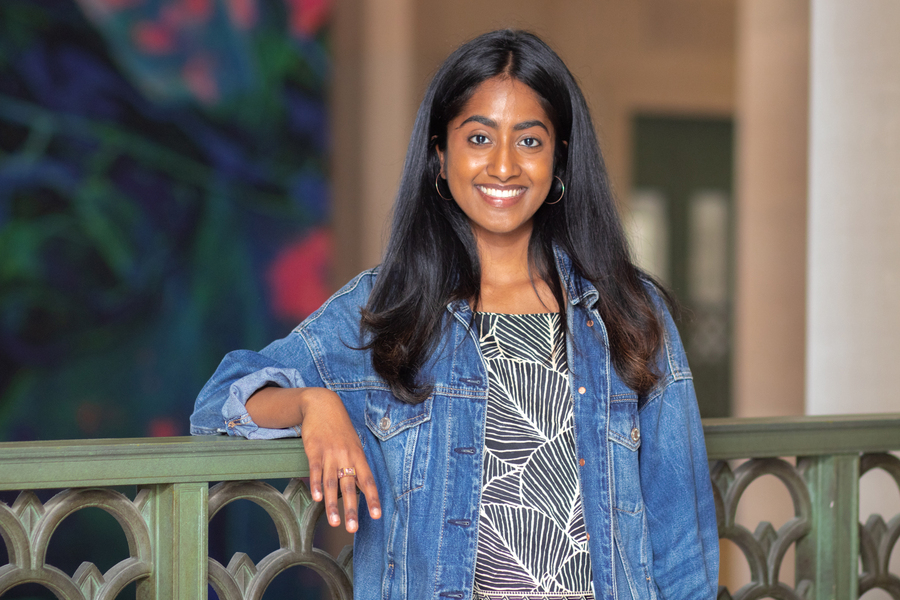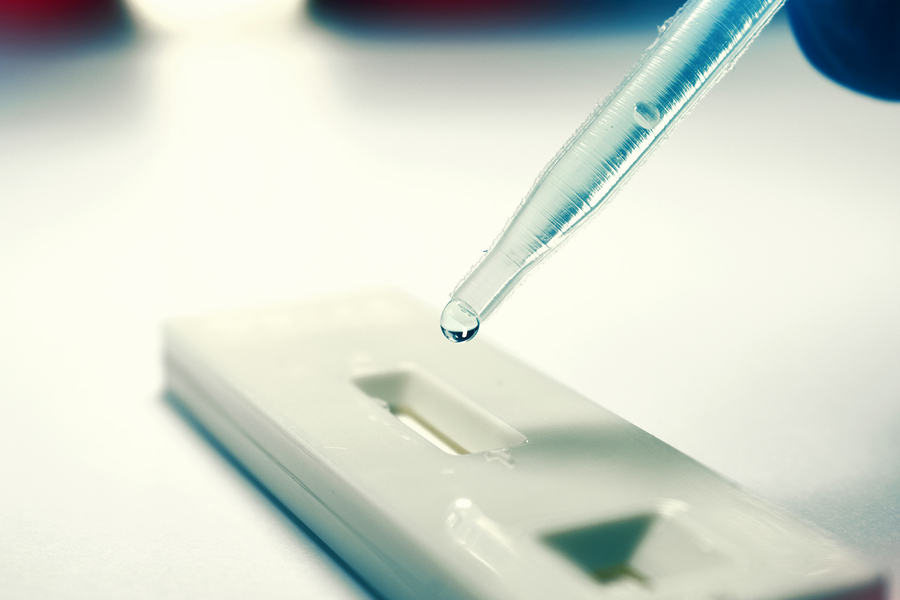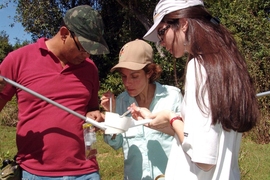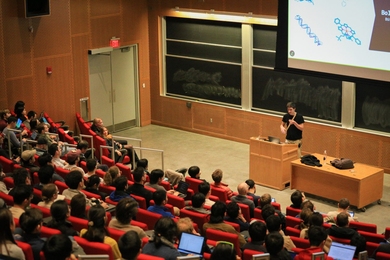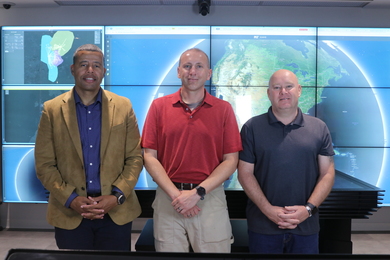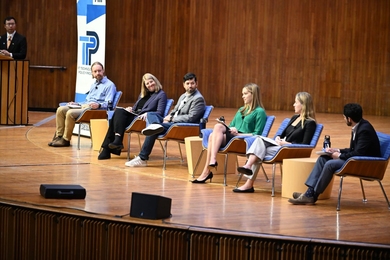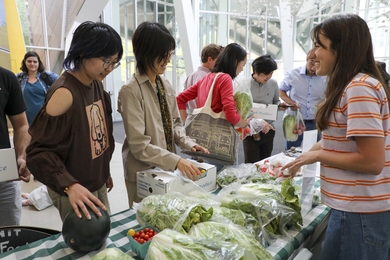Before she even set foot on the MIT campus, Ankita Reddy ’19 was exploring questions of medicine, public health, and social inequities. During high school, she produced a documentary about Henrietta Lacks, an African-American woman whose cell line has proved invaluable to medical research — but who never gave consent for its use in this way. And while interning in a lab at the National Institutes of Health, Reddy found her focus shifting to a societal picture, as federal budget reductions squeezed scientists:
"I was curious about the impacts of cuts on physicians and researchers who were struggling to sustain work on human diseases," she recalls. "I realized I was increasingly interested in finding meaningful intersections of science and the humanities."
Intersections of science and the humanities
At MIT, Reddy swiftly identified a path for pursuing discipline-spanning studies. As a double major in anthropology and biology, she put her full range of interests to work. Her senior thesis involved hybrid research in these two areas: Reddy helped develop a rapid, inexpensive diagnostic for mosquito-borne disease, and she also performed field research and analysis looking at the potential deployment of this and other diagnostic devices in developing countries.
The efficacy and success of medical advances must always be evaluated within a larger social context, Reddy says. "Infectious diseases impact communities unequally — often hitting hardest those without resources," she notes. "In order to do the most good for individual patients and to slow the spread of disease, our interventions need to take into consideration the public health capacity of communities, as well as local ideas of health and sickness."
A foundation in anthropology
Reddy credits foundational anthropology coursework for her commitment to this kind of public health approach. As a first-year student, she took 21A.331[J] (Infections and Inequalities: Interdisciplinary Perspectives on Global Health), which was taught by three professors: chemical engineer Arup Chakraborty; biologist and physician Dennis Kim; and medical anthropologist Erica Caple James, who became Reddy's advisor.
"It is fascinating to view infectious diseases through multiple lenses," says Reddy. "The goal is finding the synergy of anthropological and medical thinking to make interventions more tailored and culturally sensitive, so they can be deployed to effect widespread change," she says.
Combining anthropology with biology for a public health mission
As she honed her skills in Boston-area wet labs and pursued a developmental health clinical internship at a Johannesburg, South Africa, hospital, Reddy sought opportunities to realize her interdisciplinary ambitions. James sent Reddy to the lab of Lee Gehrke, the Hermann L.F. von Helmholtz Professor in the Institute for Medical Engineering and Science at MIT. There, she was recruited by senior researcher Irene Bosch to help design an inexpensive paper-based diagnostic for such diseases as Zika, dengue, and Chikungunya. This proved the ideal venue for Reddy to play out her fusion of anthropology and scientific interests within a public health mission.
Starting in 2017, Reddy helped tweak the diagnostics in the lab, and spent some frenzied months field-testing the devices internationally — all while carrying a full course load.
"In junior year, I took the devices to Brazil for a long weekend, and it was really challenging," she recounts. "I had to take 10 flights round-trip, which really tested my motivation and resilience."
These trips helped spark the idea behind her senior thesis in anthropology. While evaluating the efficacy of the diagnostic in the field, Reddy was also wondering how such tests "could be be meaningfully deployed in resource-poor areas."
Experience and intuition
So in 2018, with the help of an Eloranta Summer Research Fellowship, Reddy spent several months in Hyderabad and Bangalore, India, interviewing and observing physicians and medical students during rounds at infectious disease hospitals catering largely to poor populations. She hoped to learn whether mosquito-borne diseases posed a major issue for these hospitals; what kind of improvements in treatment, public health infrastructure, or diagnosis physicians might seek; and how they used technology or other methods to relieve the suffering of patients in their daily practice.
Drawing on ethnographic expertise garnered from such classes as 21A.802 (Seminar in Ethnography and Fieldwork), Reddy was able to tease out some central themes from interview transcripts and field notes.
"Experience and intuition play a huge role in medical expertise in these hospitals," says Reddy. "Everyone had a story about a physician who had a sixth sense, who knew from a glance — without using any technology — what disease a patient suffered from." Any attempt to bring new technologies into these hospital environments, she says, "must acknowledge the existing structures that are based on medical improvisation and intuition."
From diagnostics to doctor
These insights will prove useful as Reddy launches her post-graduation life as a researcher at E25Bio, a startup spun out of the Gehrke Lab. With her grasp of cultural context, Reddy hopes to help craft a realistic business model to attract funding and speed the dissemination of her team's diagnostic technology. She particularly looks forward to the project's next phase, where uploaded data from globally deployed diagnostic devices could provide a detailed picture of the spread or containment of mosquito-borne illnesses around the world.
But even as she helps advance this pathbreaking biotechnology, Reddy is intent on pursuing a more direct way of contributing to public health: She is applying to medical schools.
"I aspire to be a physician-anthropologist, because I don't think I can choose one or the other," she says. "I'd like to use the power of the white coat to listen to what people have to say, take care of them in a collaborative way, and maybe, while doing this, contribute a new perspective to both the medical and anthropology fields."
Story prepared by MIT Anthropology and MIT SHASS Communications
Communications Director: Emily Hiestand
Liaison: Irene Hartford
Writer: Leda Zimmerman
